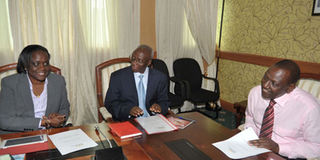Relief for consumers as Kenya Power loses bid to raise tariffs

PHOTO | PPS Deputy President William Ruto during with Energy permanent secretary Patrick Nyoike and Investment secretary Esther Koimett at his office on May 9, 2013. Mr Ruto said the government would not allow Kenya Power to increase tariffs.
What you need to know:
- In February, the company made a proposal to the Energy Regulatory Commission seeking to increase power tariffs by more than 50pc
Kenya Power’s intention to increase electricity tariffs hit a dead end on Thursday following the government’s rejection of the proposal.
Deputy President William Ruto told a meeting of Ministry of Energy, Kenya Power, the ERC and Ministry of Finance officials the government would not allow any tariff increases, saying the power distributor should find other means of raising revenue.
“Kenya Power has to sort out any inefficiency in its operations. The Government will not accept any proposal to increase power tariffs… It is a burden to the country,” Mr Ruto said in his office.
In February, Kenya Power made a proposal to the Energy Regulatory Commission seeking to increase power tariffs by more than 50 per cent to raise funds to finance the expansion of the distribution network and upgrade the current power lines to reduce blackouts.
The directive leaves the question of power outages unaddressed as Kenya Power had indicated that part of the money would go to stabilising the system.
“We cannot subsidise for power forever. Tariff reviews cannot just be upwards. Let us review it downwards,” he told the officials.
Cost of goods
Manufacturing, which utilises about 60 per cent of the energy in the country, protested the KP move, saying it would make the sector uncompetitive and cause a rise in the cost of goods.
“The industry consumes 60 per cent of the power in Kenya and therefore the increase will disproportionately negatively affect industry and consumers of industrial products will bear the brunt of the resultant increase,” Kenya Association of Manufacturers chief executive officer Betty Maina had said, condemning the KP’s proposal.
The last time electricity energy tariffs were increased was in 2008. This negatively affected the industry, according to KAM.
The manufacturing lobby said the increase was granted because Kenya Power then wanted to embark on new projects to enhance system efficiency and avoid outage and reduce system losses to no more than 15 per cent.
“The promises of 2008 have not been fulfilled and they are projecting a gloomier picture of an even higher system loss,” the lobby group said.
The country’s energy demand is also rising rapidly with little generation to feed into the growing need due to increasing urbanisation, industrialisation and the on-going rural electrification programme.
At present, the country has only 1,533 megawatts installed electricity capacity, up from 828 MW in 2003. In his address to the 11th Parliament, President Uhuru Kenyatta said one of his priorities would be to liberalise the energy sector and open it up to new sources of investment.
This will help in expanding generating capacity, extending the transmission network, improving the consistency and quality of supply and lowering the cost of energy.
Mr Kenyatta said other alternatives of energy, namely, solar, wind and geothermal plants, as well as oil, gas and coal, would be explored to provide the country with stable power supply.
The President’s proposals were echoed by University of Nairobi economics lecturer Samuel Nyandemo.
“Our energy producers should explore better means and more avenues for generating power cheaply other than moving to raise tariffs,” Dr Nyandemo speaking to Nation by telephone said, such as geothermal, biogas and animal waste.
“You have to work out a plan for enhancing an efficient, cheap and effective power supply to Kenyans. This must be done urgently,” Mr Ruto told the officials, who included Energy permanent secretary Patrick Nyoike, ERC director general Kaburu Mwirichia, Kenya Power managing director Joseph Njoroge, Investment secretary Esther Koimett and the Treasury’s senior economic adviser, Mr Kamau Thuge.
The Deputy President said high power tariffs were an impediment to development and had forced some investors to move their operations in neighbouring countries with cheaper power.




